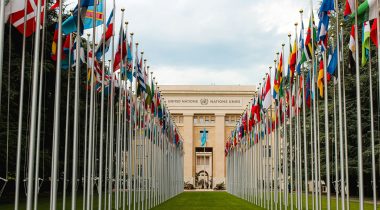
Alex Cobham ■ ‘Power concedes nothing without a demand:’ the OECD, the G77 and a UN framework convention on tax proposal

With the OECD tax reforms having lost most of their original ambition, and the remaining benefits captured almost entirely by a few larger OECD members, attention is switching to the search for alternatives. In October, the G77 – by far the largest of all the ‘G’ country groups – once again tabled at the UN its proposal for an intergovernmental tax body under UN auspices.
This idea, also long supported by the global tax justice movement, would not, of course, guarantee progress. It would however see tax negotiations take place in a globally inclusive setting, and with much greater transparency. Importantly too, it would move decisions away from the OECD which – despite the secretariat’s undoubted desire for progress – is inevitably led by its major members. And as we’ve made clear so often, the OECD’s founding members are demonstrably responsible for the clear majority of global tax abuse. Its own members also lose the greatest amounts in absolute terms, but lower-income countries lose much larger shares of their current tax revenues – with terrible implications for human rights.
It is beyond foolish to expect the OECD to be able to bring forward proposals to curb that tax abuse, or to distribute any benefits in a way that reduce the global inequalities in taxing rights faced by non-members.
But it would be equally foolish to just hope that the OECD or its major members might cede their dominance. As the US social reformer Frederick Douglass famously said, ‘Power concedes nothing without a demand.’ The G77 has now made that demand. The immediate response has been rejection. The rich countries demanded immediately that the proposal for an intergovernmental body be dropped from the text, and so it has been – for now. More extreme, these same countries refused to support the paragraph of the revised text which merely ‘noted’ the FACTI Panel – a crucial initiative whose final report lays out the necessary changes in the global architecture, including, naturally an intergovernmental tax body – and requests that the UN Secretary-General provides a report on illicit financial flows.
Frederick Douglass went on to say: ‘Find out just what any people will quietly submit to and you have found out the exact measure of injustice and wrong which will be imposed upon them.’
There seems to be a desire from the UK, effectively the largest single actor in illicit financial flows, and some other rich countries, to test exactly that boundary with regard to international tax abuse.
But the momentum is building. A key element is the growing attention to the potential specifics of an intergovernmental tax body, and we are honoured to republish here the work of Professor Sol Picciotto, coordinator of the BEPS Monitoring Group and a senior adviser to the Tax Justice Network, and Abdul Muheet Chowdhary, Senior Programme Officer at the South Centre Tax Initiative.
Their proposal for a UN framework convention on tax as the basis to establish an intergovernmental forum is a major contribution to the debate. Read their blog and report Streamlining the Architecture of International Tax through a UN Framework Convention on Tax Cooperation here.
[Image credit: “The Mountain Tops” by Jocey K is licensed under CC BY-SA 2.0]
Related articles
The elephant in the room of business & human rights
UN submission: Tax justice and the financing of children’s right to education
14 July 2025

How the UN Model Tax Treaty shapes the UN Tax Convention behind the scenes
The 2025 update of the UN Model Tax Convention
9 July 2025
One-page policy briefs: ABC policy reforms and human rights in the UN tax convention

Bad Medicine: A Clear Prescription = tax transparency
Tax justice pays dividends – fair corporate taxation grows jobs, shrinks inequality

Reclaiming tax sovereignty to transform global climate finance
The millionaire exodus myth
10 June 2025


